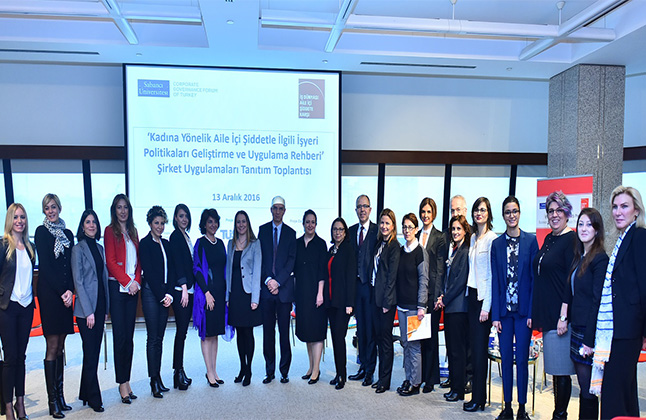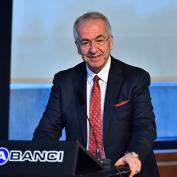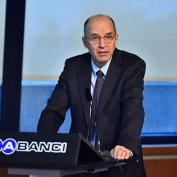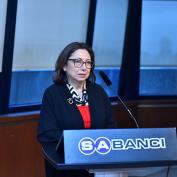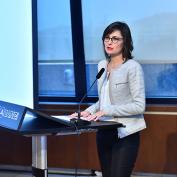Sabancı University Corporate Governance Forum, with the cooperation of TÜSİAD and with the support of the United Nations Population Fund (UNFPA) and the Sabancı Foundation, aims to enable companies to take action against the systematic pressure and violence that women employees are exposed to at home or in their close relations. Guidebook to the Development and Implementation of Company Policies Regarding Domestic Violence Against Women has been also prepared. 16 companies which has been used the guidebook and implemented their policies on the matter; gathered in Sabancı Center on 13 December 2016, with the aim of sharing their works.In the meeting held with the participation of International Labor Organization (ILO); the process of developing the policies and policies of the companies and the policies for combating domestic violence has been discussed. Openning speeches hel by Melsa Ararat, Director of Corporate Governance Forum at Sabancı University, UNFPA Turkey Representative Karl Kulessa and Tusiad Chairman Erol Bilecik. The keynote speech was delivered by International Labor Organization (ILO) Program Officer Özge Berber Ağtaş. Sabancı University Corporate Governance Forum Director Melsa Ararat said: "We are delighted to see that our biggest business groups are involved in at least one of the companies involved in the pilot implementation of our guide. The results of these pioneering companies will also encourage other companies within the same business group and will lead to widespread support mechanisms offered by employers in the fight against violence and oppression by working women. The support of this study shows the critical importance of universities' cooperation with the private sector and international institutions in coping with the primary problems of the society and finding solutions." UNFPA Turkey Representative Karl Kulessa said "Patriarchal system shows itself as a result of violence and discrimination against the woman turns out to be dominant in the business world. Prejudices against women prevent them from entering business life, from participating in decisions, from progressing and rising. One of the most serious obstacles to women in this process is domestic violence against women. Domestic violence also deeply affects the working life of women. It is therefore necessary to underline that the private sector plays a vital role in combating domestic violence against women. The United Nations Population Fund, acting with the awareness that development cannot be achieved without women, supports the private sector in the prevention of domestic violence against women as in all areas." Chairman of TUSİAD Erol Bilecik said "All segments of the society must take action to establish a sense of zero tolerance for violence against women. It is necessary to protect the rights of the women who are exposed to violence and to adopt an understanding which is in no way excused. As TÜSİAD, we support the project Business against Domestic Violence. Moving from the transformative power of the business world, we must mobilize our corporate capabilities against violence that adversely affects the lives of our female employees. I would like to congratulate the pilot companies for implementing the 'Guidebook to the Development and Implementation of Company Policies Regarding Domestic Violence Against Women'. I wish to be able to create a climate where women live safely, strengthen and strengthen society. International Labor Organization (ILO) Program Officer Özge Berber Ağtaş said "During the June 2016 International Labor Conference, the ILO has begun the standardization process of "Violence and Harassment of Women and Men in the Business World", which will lead to the first debate on a possible international instruments. Domestic violence is a form of violence based on gender. Governments, workers 'and employers' organizations and businesses recognize the impact of domestic violence on human suffering and loss of productivity. To achieve the goal of eliminating domestic violence, it requires a worldwide cooperation, including those involving business, and the ILO is committed to eliminating all forms of violence in the business world." Following the speeches, the pilot company applications panel was introduced. The moderator of the panel was Nur Ger, who is the chair of TÜSİAD Gender Equality Working Group. The panel; Aras Cargo Corporate Communications Manager Deniz Can, Aygaz Corporate Communications Manager Rişe Özkan, Erdemir Group Human Resources Director Melda Garipağaoğlu Şahin, Doğuş Group Human Resources Department Head Ebru Esmen Mete, Ericsson Human Resources Director Selen Zarakol, İnci Holding Academy Manager Füsun Toros, İpekyol Operasyonel development Manager Hacer Guler Mediterranean, organic Chemistry, Human Resources Director Asuman tireless, Sabanci University Center for Individual and Academic development Center Director Arzu Bolgül, Siemens Turkey Human Resources Director Nure Yüksel, Sun Textile-EKOTEN Human Resources Manager Deniz Koksal, TAV Group / Havas Management Systems Manager Başak Helen Taşkan and Yeşim Textile, Yeşim Academy Manager Özlem Şenkoyuncu took the floor.
